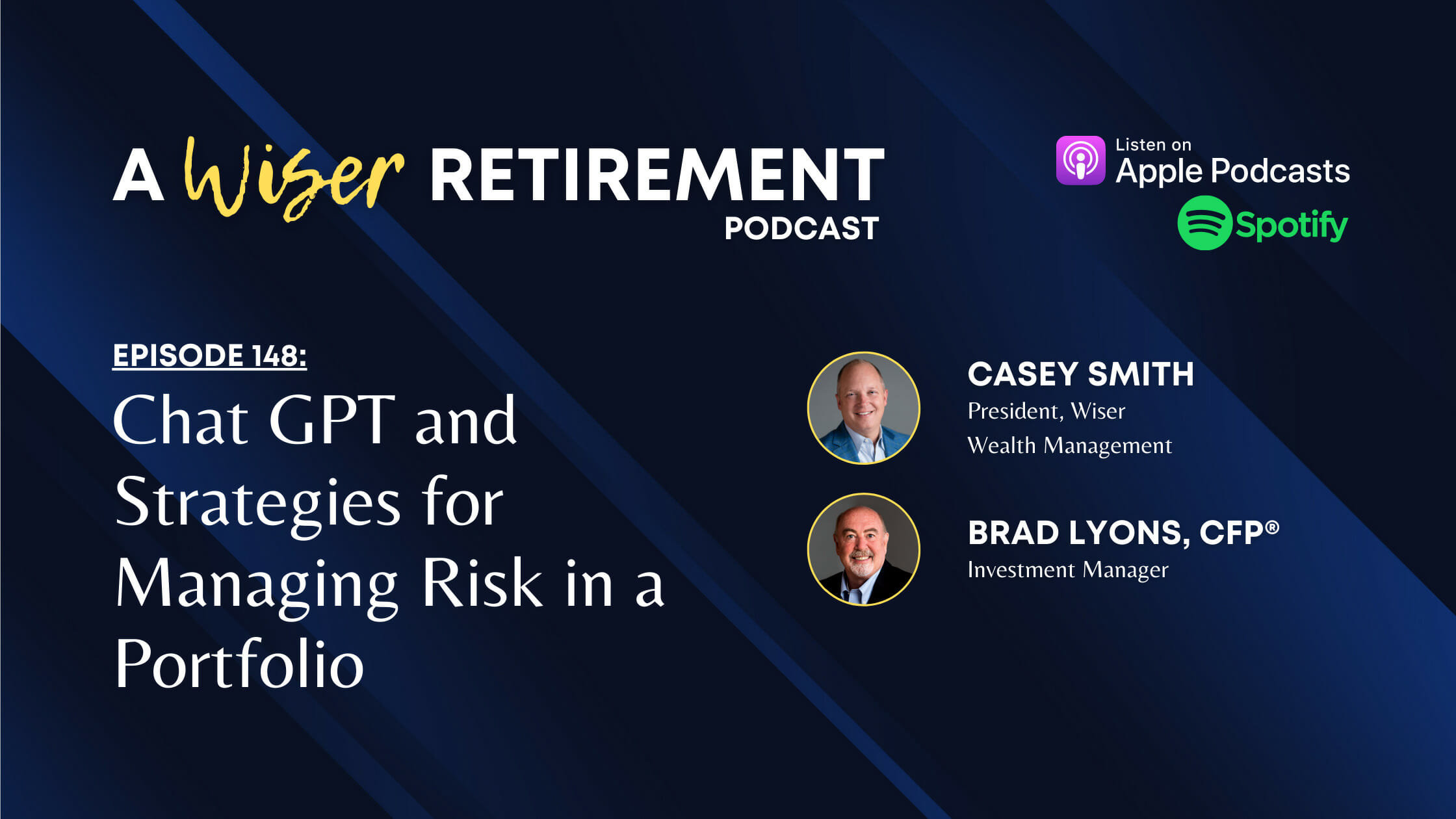
ChatGPT and Strategies for Managing Risk in a Portfolio
On this episode of A Wiser Retirement Podcast, Casey Smith and Brad Lyons, CFP® discuss Chat GPT and how AI could eventually be used in the financial services industry. They also go over different strategies for managing risk in your portfolio.
Listen on Apple Podcasts or watch on YouTube:
SUMMARY
Have You Heard of ChatGPT?
ChatGPT is a chatbot developed by OpenAI. You can ask it anything, and it learns as people use it and it interacts in a conversational way. As opposed to Siri, ChatGPT writes full articles and scripts in any language by gathering information from the web. As of now, this is a free database that offers extensive written information on most topics, but it has the potential for so much more. In the financial services industry, for example, it could be used to track emails, read them, and perform basic tasks like withdrawals and small transfers by itself. Of course, no one knows if this will ever become a reality. However, it is interesting to see technology continually evolving and being able to change life as we know it, on a daily basis.
Different Investment Classes to Manage Risk
Hedge Fund: Hedge Funds are non-regulated investment portfolios which are usually managed to multiple objectives or strategies. The fees on them a generally pretty high.
Private Equity: Private Equities are not hedge funds. They focus on investing in businesses or real estate. Private equity funds price themselves at the end of each quarter. Therefore, they’re only evaluated a few times a year, and for this reason, their volatility ends up being lower.
Real Estate: Real Estate (other than the home you live in) is a great way to manage the risk of volatility in your portfolio. The downside is that a home is marketable but is not liquid.
How to Manage Risk in Your Portfolio
Ultimately, we have to understand that there’s no strategy that entails making money without being willing to lose money. There will always be risks, the risk of inflation, risk of volatility, and the risk that your portfolio and your financial plan don’t meet their objective. When planning for retirement we set different objectives. One example is, living to age 95 and not outliving your money. Another example is having enough cash flow to meet your objectives annually. When it comes to the stock market, it is crucial to consider the market timing.
You shouldn’t buy and sell based on what the market is doing. Time might be the most efficient way to manage risk in a stock portfolio. If you are not comfortable with market volatility, a great hedge in a portfolio is the short-term U.S. treasury. Bonds can reduce volatility risk. But as we’ve explained, it is impossible to have no risks.
Managing Your Risk Tolerance
As much as others may try to sell you a secret formula for completely risk-proofing your portfolio, there are no secrets or magic tricks. What you can do is prepare yourself by having enough cash for 2 years’ worth of living expenses during retirement. Also, have a bond portfolio, which should be enough for 5 years’ worth of expenses. Finally, a stock portfolio that should not be touched.
It is understandable that human behavior at times may have a hard time with the formula we just outlined because of fear. One of the many roles of a financial advisor is to comfort clients. No matter how much they fear their plan will not work, if they follow this well-known and proved to be successful formula, everything will be ok. Also, it’s always important to remember that we don’t invest in the economy, we invest in the stock market.
Download our eBook on “Top Reasons Most Financial Plans Fail”
TIMESTAMPS:
1:54 Have you heard of ChatGPT?
10:45 Different Investment Classes
17:23 Managing Risk in your Portfolio
24:54 Managing your Risk Tolerance
LINKS:
Learn more about Casey Smith, Brad Lyons, CFP®, and Missie Beach CFP®, CDFA®
CONNECT:
Twitter, Instagram, Facebook, LinkedIn, and YouTube.
Learn more about A Wiser Retirement podcast and access previous episodes.
Share This Story, Choose Your Platform!
Wiser Wealth Management, Inc (“Wiser Wealth”) is a registered investment adviser with the U.S. Securities and Exchange Commission (SEC). As a registered investment adviser, Wiser Wealth and its employees are subject to various rules, filings, and requirements. You can visit the SEC’s website here to obtain further information on our firm or investment adviser’s registration.
Wiser Wealth’s website provides general information regarding our business along with access to additional investment related information, various financial calculators, and external / third party links. Material presented on this website is believed to be from reliable sources and is meant for informational purposes only. Wiser Wealth does not endorse or accept responsibility for the content of any third-party website and is not affiliated with any third-party website or social media page. Wiser Wealth does not expressly or implicitly adopt or endorse any of the expressions, opinions or content posted by third party websites or on social media pages. While Wiser Wealth uses reasonable efforts to obtain information from sources it believes to be reliable, we make no representation that the information or opinions contained in our publications are accurate, reliable, or complete.
To the extent that you utilize any financial calculators or links in our website, you acknowledge and understand that the information provided to you should not be construed as personal investment advice from Wiser Wealth or any of its investment professionals. Advice provided by Wiser Wealth is given only within the context of our contractual agreement with the client. Wiser Wealth does not offer legal, accounting or tax advice. Consult your own attorney, accountant, and other professionals for these services.





